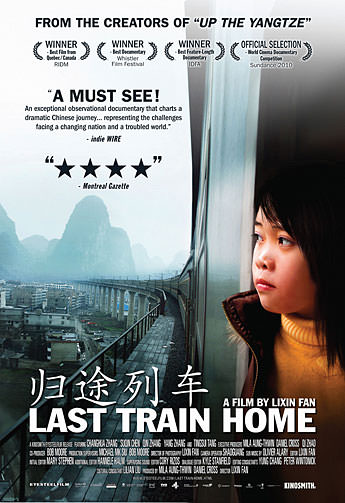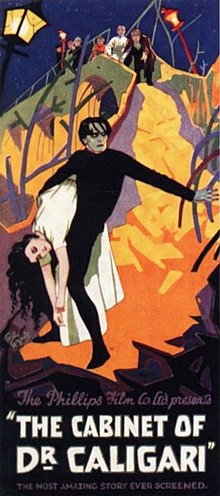Friday, 8 June 2012
Last Train Home review (Arthouse film #2)
This Arthouse film was directed by Lixin Fan in 2009. This is another movie that took several years to film, however, this one is a documentary on the absolute chaos that ensues at New Year's in China. Fan travels with one couple who have taken the same journey back home every year for almost 20 years. As with a majority of China's working population, Changhua and Sugin Zhang had to leave behind their children in order to take on a job in a factory. Their daughter Qin has turned into a rebellious teenager who has bitter feelings towards the couple for leaving her to work in factories. This is an extremely touching and emotional film. I give this movie a personal score of 9/10.
Waste Land review (Arthouse film #1)
This Arthouse film was directed by Lucy Walker in 2010. Astonishingly, this movie took 3 full years to film. It follows artist Vik Muniz on his journey from Brooklyn to Brazil, his home country. He visits the world's largest waste dump, where he meets a group of catadores (pickers of anything recyclable). His intention was to paint these catadores with rubbish, but the catadores start to rethink their lives in the process of these images being created. I give this movie a personal score of 6/10.
Three Kings review
This action was directed by David O Russel in 1999. It follows a group of soldiers in the conflict in Iraq. Three of the soldiers, Major Archie Gates (George Clooney), Sergeant Troy Barlow (Mark Wahlberg) and Chief Elgin (Ice Cube), decide to steal a large cache of solid gold after they find a map hidden on one of Saddam Hussein's men. However on the journey to finding this cache they come across numerous problems with the cease fire in order in Iraq. The three rescue an entire village from the grasps of Hussein, the villagers then assist the soldiers in moving the stolen gold using trucks secretly stolen from the military camp. Eventually the group gets found out and tracked down by American soldiers as they are in the process of getting the villagers across the border. I give this movie a personal score of 9/10.
Bonnie and Clyde review
This drama/action was directed by Arthur Penn in 1967. It is based on the true story of Clyde Barrow and Bonnie Parker. Bonnie gets excited when Clyde robs a store in front of her. The pair then go on a crime spree after Clyde steals a car, they go from town to town pulling off smaller heists until they meet up with Buck Barrow (Gene Hackman), his wife Blanche (Estelle Parsons) and a dim witted service station attendant by the name of C.W Moss (Michael J. Pollard). At this point they are tailed by the police after robbing a bank. I give this film a personal score of 8/10.
Persona review
This drama was directed by Ingmar Berman in 1966. This film follows nurse Alma (Bibi Andersson) and her patient Elisabet Vogler (Liv Ullmann). Elisabet simply does not want to talk and her psychiatrist sends her to a small seaside cottage with Alma caring for her. the relationship between the two gets very tense as Alma tells Elisabet of one of her sexual experiences on a beach and then reads one of Elisabet's letters without Elisabet's knowledge. I give this movie a personal score of 4/10.
Breathless review
This drama was directed by Jean-Luc Godard in 1960. It follows Michel Poiccard and Patricia Franchini. Poiccard is wanted by the police for killing an officer and Franchini sells the newspaper "International Herald Tribune" in Paris. As the movie progresses the couple fall further in love as they attempt to hide Poiccard from being found by the police. I give this film a personal score of 5/10.
Double Indemnity review
This drama was directed by Billy Wilder in 1944. It follows Phyllis Dietrichson (Barbara Stanwyck) who seduces an insurance agent; Walter Neff (Fred MacMurray) into committing a murder of her husband so she can get his insurance money. Neff's boss Barton Keyes (Edward G. Robinson) takes over the investigation of this murder and the issues between Neff and Dietrichson gets more and more complicated. I give this film a personal score of 7/10.
The Bicycle Thief review
This drama was directed by Vittorio De Sica in 1948. This film is a brilliant take on the aftermath of World War II and its social issues. It follows Antonio (Lamberto Maggiorani) who finds a job that requires him to use a bicycle, but the bike he purchases gets stolen on his very first day of work. Antonio and his son Bruno (Enzo Staiola) conduct a search for the stolen bike. The main focus of this film was the relationship between Antonio and his son as well as the poverty in Italy after World War II. I give this film a personal score of 8/10.
Citizen Kane review
This film was directed by Orson Welles in 1941. It follows a newspaper reporter, Jerry Thompson (William Alland) who is sent to investigate the death of Charles Foster Kane (Orson Welles) after he uttered a single word at the time of his death: "Rosebud". Thompson interviews all manner of people including Kane's family, associates and friends. Thompson eventually learns about Kane's tragic childhood secret; the fact that he was abandoned by his parents, as well as conflicts with his guardian Walter Parks Thatcher (George Coulouris) and his desire to run a newspaper company with the assistance of his childhood friend Jedediah Leland (Joseph Cotten) and Mr. Bernstein (Everett Sloane). I give this movie a personal score of 9/10.
Grand Illusion review
This silent drama was directed by Jean Renoir in 1937. This film is set in World War I and follows two people; Captain de Boeldieu and his mechanic Lieutenant Marèchal, who are shot down and treated with typical officers hospitality. The two men are sent to a German PoW camp where they plot to escape the camp with a group of other prisoners. Their plan fails as they are sent to a whole new camp; the Wintersborn fortress. The leader of this camp attempts to make acquaintances with the Captain but the Captain is already busy with another escape plan. I give this movie a personal score of 8/10.
Battleship Potemkin review
This silent drama was directed by Sergei Eisenstein in 1924. It follows the crew of Battleship Potemkin, who eventually get fed up with the cruelty of their superior officers and staged a mutiny against said officers. This led to a revolt of the Soviet citizens against the Czarist ruling. I give this film a personal score of 8.5/10.
Metropolis review
This silent drama was directed by Fritz Lang in 1927. This film takes place in a futuristic environment that is divided into the average worker and the city planners. The city ruler's son, Freder Frederson, ventures into the workers section of the city and becomes one of them, where he meets Maria, leader of a group that revolts against the government for the unfair treatment laid upon them. I give this film a personal score of 5/10.
The Cabinet of Dr. Caligari review
This silent short film was directed by Robert Weine in 1920. It follows Dr. Caligari (Werner Krauss), a hypnotist who travels to different circuses with his somnambulist Cesare (Conrad Veidt) and in one town they visit various murders occur. Little to the town's knowledge, Caligari had actually been ordering Cesare to perform these murders. Cesare and Caligari eventually get found out by Francis (Friedrich Feher) who is the "hero" of this film. I give this short film a personal score of 8.5/10.
Birth of a Nation Review
This silent drama was directed by D.W Griffith in 1915. It is a short film in two parts. Part 1 follows two families (the Northern Stoneman's and the Southern Cameron's) and their path through the Civil War and its aftermath. Ben Cameron decides to form a cult (the Ku Klux Klan) to stop the "blacks" from taking over his beloved Southland but when Flora Cameron jumps to her death the "KKK" wages war on the Northerners to restore the peace in his land. In my opinion this is an absolute epic for its time and deserves a personal score of 9/10.
Subscribe to:
Comments (Atom)













